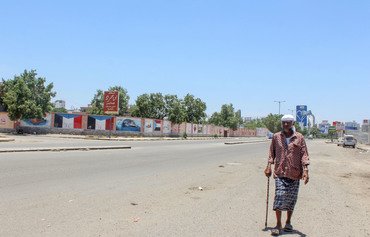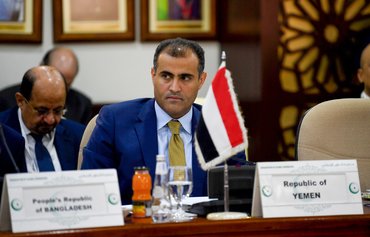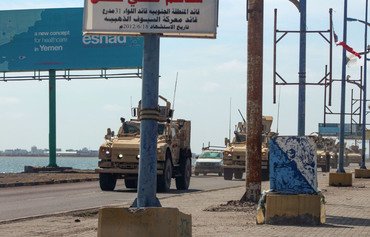Implementing a power-sharing agreement signed in Riyadh between the Yemeni government and the Southern Transitional Council (STC) is the best means to resolve the grievances in southern Yemen, officials said Tuesday (April 28th).
The Arab coalition on Monday rejected a declaration of self-rule by the separatist STC, issued a day earlier, and demanded "an end to any escalatory actions", stressing the need to "promptly implement the Riyadh agreement".
The STC issued its declaration of self-administration and state of emergency in the southern provinces after services deteriorated in these areas following devastating floods which killed dozens and destroyed houses and properties.
The Saudi-led Arab coalition, in which the UAE serves as a key partner, eschewed such escalatory steps, and urged all parties to immediately resume the implementation of the Riyadh agreement.
This calls for the formation of a government of technocrats and the resumption of the Yemeni government's work from Aden, the interim capital, to confront economic and developmental challenges.
The Yemeni government has said it considers the STC declaration to be an armed rebellion that runs counter to the Riyadh agreement.
Call for 'comprehensive dialogue'
UN Secretary-General Antonio Guterres on Monday urged all parties to engage in comprehensive dialogue to resolve disputes over the implementation of the Riyadh agreement.
He called for all efforts to be focused on preventing the spread of novel coronavirus (COVID-19) in Yemen.
UN special envoy for Yemen Martin Griffiths also said he was concerned by the declaration, calling for expediting the implementation of the Riyadh deal, AFP reported.
"The Riyadh agreement provides for the participation of the STC in consultations on the final political solution to end the conflict in Yemen and serving the interests of Yemenis nation-wide," he said in a statement.
"The latest turn of events is disappointing, especially as the city of Aden and other areas in the south have yet to recover from flooding and are facing the risk of COVID-19," Griffiths said.
"Now, more than ever, all political actors must co-operate in good faith, refrain from taking escalatory actions, and put the interests of Yemenis first."
Commitment to Riyadh agreement
Information Minister Muammar al-Eryani said Yemen's government welcomed the Arab coalition's statement, which expressed a clear position and called for accelerating the implementation of the Riyadh agreement.
In a social media post, al-Eryani confirmed the legitimate government's full commitment to the Riyadh agreement and its immediate implementation.
He stressed that the government would not be drawn by STC provocations, and "is keen on preserving the country's higher interests and unifying efforts to confront the real threat to the security and stability of Yemen and the region".
Deputy Aden governor Ghassan al-Zamki told Al-Mashareq that people in Aden want stability, and do not want to see more violence or armed conflicts.
"The implementation of the Riyadh agreement is the most suitable solution to normalise conditions, speed up relief efforts and restore services after the floods in Aden," he said.
"Citizens support the legitimate government and do not want to see new cycles of violence," he added.
While there were demonstrations in support of the STC's declaration in the Hadramaut provincial capital of al-Mukalla, the governors of Hadramaut, al-Mahrah, Shabwa, Socotra and Abyan have issued statements rejecting the declaration.
Finding a peaceful solution
STC spokesman Nizar Haitham said the STC supports the Arab coalition.
The self-administration and emergency declaration came, he said, because of the deteriorating conditions following the Aden floods and the government's failure to play its role and to implement the Riyadh agreement.
"International pressures continue to mount on the legitimate government to implement the Riyadh agreement and find a peaceful solution that would guarantee the political rights of the south," Haitham told Al-Mashareq.
"The mistakes which the legitimate government made in running Aden and southern provinces have created feelings of resentment," political analyst Abdulmalik al-Youssefi told Al-Mashareq.
This "pressured the STC to declare its steps, especially following the catastrophic floods in Aden", he said, noting that the STC's declaration might serve as a catalyst for a return to the implementation of the Riyadh agreement.
"The self-administration is not self-rule," al-Youssefi said. "It is part of the federal state and not separation, although they have the right to that via a self-determination referendum, once the state has been restored."
"Forming a government of technocrats as per the Riyadh agreement will be the fastest solution to restoring the situation to the way it was, and ending any escalatory steps from any party," he noted.

![A fighter with the Southern Transitional Council mans a gun in the back of a truck advancing past the Yemen Petroleum company's branch in the southern city of Aden, on April 26th, after the STC declared self-administration in the south. [Saleh al-Obeidi/AFP]](/cnmi_am/images/2020/04/28/23779-Yemen-separatist-fighter-600_384.jpg)







Thanks. We hope to pay more attention to things that benefit the Yemeni society and the international community.
Reply3 Comment(s)
I want local news.
Reply3 Comment(s)
We need to know the provisions of Riyadh Agreement so we can know the evil and good. The agreement must be published in full because we’re dignified people and we don’t accept humiliation and insult. It’s too late for the mercenaries and boot-lickers; Aden will be victorious forever. This nation can’t be governed by one single tribe. Tribalism doesn’t go well with modernity, and history won’t have mercy on anyone. The dustbin of history is full with those who are damned whenever they are mentioned.
Reply3 Comment(s)